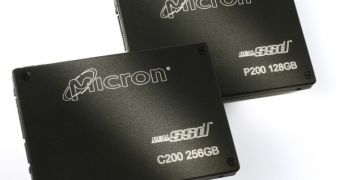Micron, a flash-based products manufacturer, introduced yesterday its next-generation RealSSD solid state drives designed for enterprise computing and notebook applications. The company has brought to light two new models, the RealSSD P200 and the RealSSD C200, meant to bring about a boost in capacity, power and performance for the applications they serve.
"We are seeing SSD interest in a variety of applications where historically hard disk drives have reigned. For many, the most logical place is in notebook computers, but there is incredible value for SSDs in enterprise server systems," said Dean Klein, vice president of memory system development at Micron.
The enterprise-oriented RealSSD P200 is touted as being 10 times faster at accessing transactional data when compared with a typical enterprise HDD. According to the company, it can achieve a sub-millisecond latency while standard enterprise HDDs have an average latency of approximately eight milliseconds. The drive's power specifications are also impressive, as it consumes about one-tenth the power of a typical data center hard drive, according to the official announcement. The P200 is rated at a 2.5 watts power consumption in working mode, and 0.3 watts when idle.
The 2.5-inch P200 solid state drive will be offered in various storage capacities, ranging from 16GB to 128GB. Based on Micron's high-performance single-level cell NAND technology, the P200 comes equipped with the 3Gb/s SATA interface.
The C200 is the company's new consumer-oriented notebook solid state drive. Just like the RealSSD P200, the C200 also comes in a 2.5-inch form factor, but a 1.8-inch model will also be made available. The 2.5-inch C200 drives will be offered in densities of up to 256GB, while the smaller 1.8-inch version will go up for sale with densities ranging from 32GB to 128GB. Both models of the C200 drives will be equipped with a SATA 3 GB/s interface.
"With our C200 products, we are providing a balanced price to performance solution specifically designed for notebook applications by utilizing MLC NAND technology and highly optimized NAND management algorithms," said Klein.

 14 DAY TRIAL //
14 DAY TRIAL //